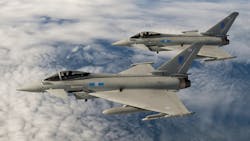BAE Systems Reports 14% Annual Net Profit Drop
LONDON — BAE Systems said Thursday that stretched defense budgets weighed on the group's profits in 2012 and warned that fresh cutbacks could force it to axe 3,500 jobs at U.S. shipyard operations.
Net profits dropped 14% to £1.07 billion (US $1.63 billion) last year, compared with 2011, BAE said in a results statement.
Revenues slid 7% to £17.83 billion in 2012 compared with a year earlier, as the British and U.S. governments tightened their defense budgets amid global economic strains.
BAE briefly mentioned the collapse of last year's mega-merger with EADS, noting that it would have been an "exciting development" but adding that no "acceptable" agreement to all parties could be found.
"Following a period of growth, defense budgets in the U.S. have flattened and are expected to remain constrained in response to reducing overseas operations and measures to address federal deficits," BAE said in the results statement.
"In the UK, the defense market has stabilized following changes to program priorities outlined in 2010 through the UK government's Strategic Defense and Security Review."
BAE added that "the overall outlook in both countries is expected to continue to be constrained."
And the company warned that it could slash 3,500 jobs at its U.S. ship repair operations after the U.S. Navy served notice on a number of maintenance requirements amid uncertainty over U.S. budget talks.
"BAE Systems has been informed by the U.S. Navy of its 'intent to cancel' a number of ship maintenance availabilities if current and long-term budget negotiations are not resolved between Congress and the White House," it said in a separate statement.
"These actions, if carried out, would significantly impact our ship repair operations in Norfolk, Va.; San Diego, Calif.; Mayport, Fla.; and Pearl Harbor, Hawaii.
"Therefore, as a result of this possibility, we have informed 3,500 of our employees in advance ... that their jobs may be terminated if these Navy cancellations occur."
The company added it would repurchase up to £1.0 billion worth of its shares over three years.
For BAE, 2012 was dominated by the failure of its proposed $45-billion blockbuster merger with EADS.
A plan to create the biggest aerospace and defense group in the world was brought down last October by unexpectedly strong opposition from Germany.
EADS had wanted to expand in the United States and gain better access to a civil aviation market which is forecast to grow in coming years, to reinforce its defense activities.
The U.S. market accounts for 40% of BAE Systems' total group revenues, making it the biggest foreign supplier of military goods to the Pentagon, while the EADS deal had been seen as a boost for BAE amid government defense cuts.
BAE has ramped up its focus on the United States in recent years, with the acquisition of United Defense Industries for $4.2 billion in 2005 and Armor Holdings for $4.1 billion in 2007.
In the U.S., it is a key supplier for the F-35 Joint Strike Fighter jet and is also responsible for the Trident nuclear submarine program.
BAE, which also manufactures Bradley fighting vehicles, Challenger tanks and Queen Elizabeth aircraft carriers, said on Thursday that its strategic aim following the merger collapse "was to drive shareholder value."
It is meanwhile part of the Eurofighter Typhoon consortium that includes the German and Spanish subsidiaries of EADS, as well as Italy's Finmeccanica.
In December, BAE announced a £2.5-billion deal to sell 12 Typhoons and eight Hawk trainer planes to Oman.
But the firm warned that a lucrative deal to sell fighter jets to Saudi Arabia was facing unresolved issues more than five years after an agreement was struck between the two sides.
BAE and Saudi Arabia signed a £4.5-billion deal in 2007 to supply 72 Typhoon jets to Riyadh.
Copyright Agence France-Presse, 2013
About the Author
Agence France-Presse
Copyright Agence France-Presse, 2002-2025. AFP text, photos, graphics and logos shall not be reproduced, published, broadcast, rewritten for broadcast or publication or redistributed directly or indirectly in any medium. AFP shall not be held liable for any delays, inaccuracies, errors or omissions in any AFP content, or for any actions taken in consequence.
